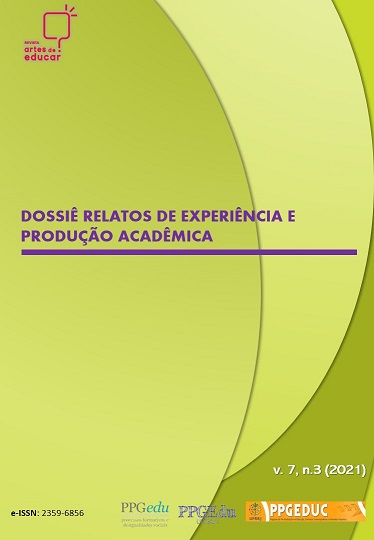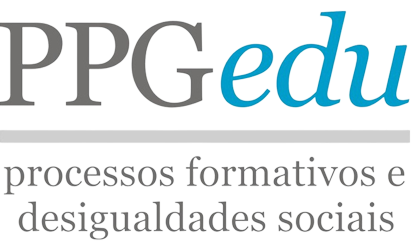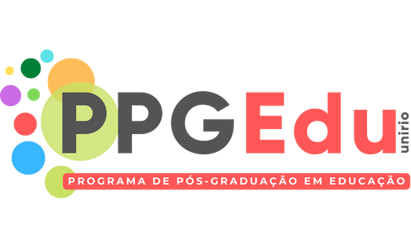CONTRIBUIÇÕES TEÓRICAS E CONCEITUAIS DE VIGOTSKI PARA A PESQUISA QUALITATIVA EM EDUCAÇÃO
DOI:
https://doi.org/10.12957/riae.2021.63920Palabras clave:
Vigotski, método, pesquisa em educação, desenvolvimento cultural, sociogênese, mediação semiótica, perspectiva histórico-cultural.Resumen
A abordagem de Vigotski para o desenvolvimento humano está profundamente entrelaçada com sua investigação metodológica. Essa investigação está relacionada à sua persistente busca por compreender o problema da consciência. A incansável busca do autor por uma explicação plausível das bases materiais das funções psíquicas especificamente humanas permeia seu trabalho teórico, prático e empírico nos campos da psicologia e da educação. Nessa sua busca, a sociogênese e a mediação semiótica, tomadas inicialmente como hipóteses investigativas, tornam-se princípios explicativos. Trechos de seus textos seminais permitem acompanhar a elaboração dos pressupostos epistemológicos que ancoram sua teorização e evidenciam as relações entre objeto de estudo, princípio explicativo e unidade de análise nas pesquisas do desenvolvimento cultural do ser humano. Uma de suas principais preocupações dizia respeito aos modos de ensinar e de estudar as relações de ensino, bem como aos resultados ou efeitos dessas relações. Falar sobre as elaborações teóricas de Vigotski é, portanto, falar sobre o método – de inquirir, de investigar, de ensinar. Do início ao fim de seu esforço teórico, encontramos uma profunda preocupação sobre o que significa ser humano e quais são os meios/modos de se tornar humano. As repercussões e contribuições da abordagem de Vigotski para a pesquisa em educação, assim como suas implicações éticas e políticas, merecem ser destacadas. Sua forma de conceber o método escapa da rigidez, não do rigor, apontando para uma instigante flexibilidade que aproxima seus esforços aos de muitos autores contemporâneos em diferentes campos de conhecimento.
Citas
AGUIAR, W. M. J. (Ed.). Sentidos e significados do professor na perspectiva sócio-histórica: relatos de pesquisa. São Paulo: Casa do Psicólogo, 2006.
ÁLVAREZ, A.; DEL RÍO, P. The zone of proximal development: Inside and outside. In: DANIELS, H., COLE, M.; WERTSCH, J. V. (Eds.). The Cambridge companion to Vygotsky. Cambridge: Cambridge University Press, 2007. p. 276–303.
BERNARDES, M. E. M. O método de investigação na psicologia histórico-cultural e a pesquisa sobre o psiquismo humano. Revista Psicologia Política, v. 10, n. 20, p. 297-313, 2010.
BRUNER, J. Introduction. In: VYGOTSKY, L. S. Thought and language. Cambridge: MIT Press, 1962.
BRUNER, J. Prologue to the English edition. In: RIEBER, R. W.; CARTON, A. S. (Eds.). The collected works of L. S. Vygotsky: Problems of general psychology. New York: Plenum Press, 1987. p. 35–283. v. 1.
CANDELA, A.; ROCKWELL, E. Construcción social del conocimiento en el aula: Un enfoque etnográfico. Infancia y Aprendizaje, v. 14 n. 55, p. 3–11, 1991.
CHAIKLIN, S. The zone of proximal development in Vigotski’s analysis of learning and instruction. In: KOZULIN, A., et al. (Eds.). Vygotsky’s educational theory in cultural context. Cambridge University Press, 2003.
CHAIKLIN, S. (Ed.). The theory and practice of cultural-historical psychology. Aarhus: Aarhus University Press, 2001.
CHAIKLIN, S.; LAVE, J. (Eds.). Understanding practice. Cambridge, U.K.: Cambridge University Press, 1996.
CLOT, Y. La function psychologique du travail. Paris: Presses Universitaires de France, 1999a.
CLOT, Y. (Ed.). Avec Vygotski. Paris, France: La Dispute, 1999b.
CLOT, Y. (Ed.). Vygotski maintenant. Paris, France: La Dispute, 2012.
COLE, M. The zone of proximal development: Where culture and cognition create each other. In: WERTSCH, J. V. (Ed.). Culture, communication and cognition: Vygotskian perspectives. Cambridge, U.K.: Cambridge University Press, 1985. p. 146–161.
DANIELS, H. (Ed.). Charting the agenda: Educational activity after Vigotski. London, U.K.: Routledge, 1993.
DANIELS, H.; COLE, M.; WERTSCH, J. V. (Eds.). The Cambridge companion to Vygotsky. Cambridge, U.K.: Cambridge University Press, 2007.
DANIELS, H.; HEDEGAARD, M. (Eds.). Vygotsky and special needs education rethinking support for children and schools. London, U.K.: Continuum International, 2011.
DAVIS, S. et al. (Eds.). Dramatic interactions in education: Vygotskian and sociocultural approaches to drama, education and research. London, U.K.: Bloomsbury, 2015.
DAVYDOV, V. V. La enseñanza escolar y el desarrollo psíquico. Moscou: Progresso, 1988.
DAVYDOV, V. V. The influence of L. S. Vygotsky on education theory, research and practice. Educational Researcher, v. 24, n. 3, p. 12–21, 1995.
DAVYDOV, V. V. What is real learning activity? In: HEDEGAARD, M.; LOMPSTER, J. (Eds.). Learning activity and development. Aarhus: Aarhus University Press, 1999.
DAVYDOV, V. V.; RADZIKHOVSKII, L. A. Vygotsky’s theory and the activity-oriented approach in psychology. In: WERTSCH, J. V. (Ed.), Culture, communication, and cognition. New York: Cambridge University Press, 1985. p. 35–65.
DEL RÍO, P. The external brain: Eco-cultural roots of distancing and mediation. Culture & Psychology, v. 8, n. 2, p. 233–265, 2002.
DEL RÍO, P. Educación y evolución humana: contribución al debate ¿Qué teorías necesitamos en educación? Cultura y Educación, v. 19, n. 3, p. 231–241, 2007.
DELARI JUNIOR, A. Questões de método em Vigotski: busca da verdade e caminhos da cognição. In: TULESKI, S. C.; CHAVES, M.; LEITE, H. A. (Eds.). Materialismo histórico-dialético como fundamento da psicologia histórico-cultural: método e metodologia de pesquisa. Maringá: Eduem, 2015. p. 43–82.
DUARTE, N. Educação escolar, teoria do cotidiano e a escola de Vigotski. Campinas: Autores Associados, 1996.
ENGESTROM, Y. Putting Vygotsky to work: The change laboratory as an application of double stimulation. In: DANIELS, H.; COLE, M.; WERTSCH, J. V. (Eds.). The Cambridge companion to Vigotski. Cambridge, U.K.: Cambridge University Press, 2007. p. 363–382.
ENGESTROM, Y.; SANNINO, A.; VIRKKUNEN, J. On the methodological demands of formative interventions. Mind, Culture, and Activity, v. 21, n. 2, p. 118–128, 2014.
FACCI, M. G. D.; TULESKI, S. C.; BARROCO, M. S. (Eds.). Escola de Vigotski: contribuições para a psicologia e a educação. Maringá: Eduem, 2009.
FLEER, M.; GONZALEZ REY, F.; VERESOV, N. (Eds.). Perzhivanie, emotions and subjectivity: Advancing Vigotski’s legacy. Singapore: Springer, 2017.
FREITAS, M. T. A. Cibercultura e formação de professores. Belo Horizonte: Autêntica, 2009.
GÓES, M. C. R., de. Linguagem, surdez e educação. Campinas: Autores Associados, 1996.
GÓES, M. C. R., de; LAPLANE, A. L. F., de. (Eds.). Políticas e práticas de educação inclusiva. Campinas: Autores Associados, 2004.
GÓES, M. C. R., de; PINO, A. Apresentação. Cadernos Cedes, v. 24, p. 5–9, 1991.
GONZÁLEZ REY, F. Advancing the topics of social reality, culture, and subjectivity from a cultural-historical standpoint: Moments, paths, and contradictions. Journal of Theoretical and Philosophical Psychology, v. 36, n. 3, p. 175–189, 2016a.
GONZÁLEZ REY, F. Marxismo, subjetividad y psicología cultural-histórica: avanzando sobre un legado inconcluso. Teoría y Critica de la Psicología, v. 7, p. 40–55, 2016b.
HEDEGAARD, M. The zone of proximal development as basis for instruction. In: MOLL, L. C. (Ed.). Vygotsky and education. Cambridge, U.K.: Cambridge University Press, 1990. p. 349–371.
HEDEGAARD, M. How instruction influences children’s concepts of evolution. Mind, Culture, and Activity, v. 3, n. 1, p. 11–24, 1996.
HEDEGAARD, M.; LOMPSCHER, J. (Eds.). Learning activity and development. Aarhus: Aarhus University Press, 1999.
KOZULIN, A. Vygotsky's psychology: A biography of ideas. Cambridge, MA: Harvard University Press, 1990.
KOZULIN, A. et al. (Eds.). Vygotsky’s educational theory in cultural context. Cambridge, U.K.: Cambridge University Press, 2003.
LAVE, J. Teaching, as learning, in practice. Mind, Culture, and Activity, v. 3, n. 3, p. 149–164, 1996.
LAVE, J.; WENGER, E. Situated learning: Legitimate peripheral participation. Cambridge, U.K.: Cambridge University Press, 1991.
LEONTIEV, A. N. On Vygotsky’s creative development. In: RIEBER, R. W.; WOLLOCK, J. (Eds.). The collected works of L. S. Vygotsky: Problems of the theory and history of psychology. New York: Plenum Press, 1997. p. 9–34. v. 3.
LEONTIEV, A. N. The development of mind. In: CC-SA, Marxists Internet Archive. Selected works of Aleksei Nikolaevich Leontyev, 2009.
LIBÂNEO, J. C.; FREITAS, R. A. M. M. Vasily Vasilyevich Davydov: a escola e a formação do pensamento teórico-científico. In: LONGAREZI, A. M.; PUENTES, R. V. (Eds.). Ensino desenvolvimental: vida, pensamento e obra dos principais representantes russos. Uberlândia: EDUFU, 2013.
LONGAREZI, A. M.; PUENTES, R. V. (Eds.). Ensino desenvolvimental: vida, pensamento e obra dos principais representantes russos. Uberlândia: EDUFU, 2013.
LURIA, A. The development of writing in the child. Soviet Psychology, v. 16, n. 2, p. 65–114, 1977.
MARX, K. Para a crítica da economia política. In: GIANNOTTI, J. A. (Ed.). Marx: vida e obra. São Paulo: Nova Cultural, 1999.
MARX, K.; ENGELS, F. A ideologia alemã (Feuerbach). São Paulo: Hucitec, 1987.
MATUSOV, E. In search of “the appropriate” unit of analysis for sociocultural research. Culture & Psychology, v. 13, n. 3, p. 307–333, 2007.
MESHCHERYAKOV, B. G. Views of L. S. Vygotsky at the science about children’s development. Psicologia USP, v. 21, n. 4, p. 703–726, 2010.
MIND, CULTURE, AND ACTIVITY: An International Journal. Ed. especial: Symposium on Perezhivanie, v. 23, n. 4, 2016.
MOLL, L. C. (Ed.). Vygotsky and education: Instructional implications and applications of sociohistorical psychology. Cambridge, U.K.: Cambridge University Press, 1990.
MORO, C.; SCHNEUWLY, B.; BROSSARD, M. (Eds.). Outils et signes. Perspectives actuelles de la théorie de Vygotski. Bern: Peter Lang, 1997.
MORTIMER, E. F. Linguagem e formação de conceitos no ensino de ciências. Belo Horizonte: UFMG, 2000.
NEWMAN, D.; GRIFFIN, P.; COLE, M. The construction zone: Working for the cognitive change in school. Cambridge, U.K.: Cambridge University Press, 1989.
OLIVEIRA, M. K., de. Vigotski: aprendizado e desenvolvimento. Um processo sócio-histórico. São Paulo: Scipione, 1993.
PADILHA, A. M. L.; OLIVEIRA, I. M., de. (Eds.). Educação para todos: as muitas faces da inclusão escolar. Campinas: Papirus, 2013.
PARADISE, R. Cultural knowledge in the classroom: Indigenous children and their orientation towards observation. Infancia y Aprendizaje, v. 14, n. 55, p. 73–85, 1991.
PINO, A. The social and the cultural in Vygotsky’s work. Educação & Sociedade, v. 71, p. 45–78, 2000.
RIEBER, R. W. (Ed.). The collected works of L. S. Vygotsky: The history of the development of higher mental functions. New York: Plenum Press, 1997. v. 4.
RIEBER, R. W.; CARTON, A. S. (Eds.). The collected works of L. S. Vygotsky: The fundamentals of defectology (abnormal psychology and learning disabilities). New York: Plenum Press, 1993. v. 2.
RIEBER, R. W.; CARTON, A. S. (Eds.). The collected works of L. S. Vygotsky: Problems of the theory and history of psychology. New York: Plenum Press, 1997. v. 3.
ROCKWELL, E. Historical consciousness and critical thinking: Reflections on an indigenous movement. Educational Foundations, v. 13, n. 3, p. 23–39, 1999.
ROCKWELL, E.; MERCADO, R. La escuela, lugar del trabajo docente. México: DIE- CINVESTAV-IPN, 1999.
ROGOFF, B. Apprenticeship in thinking: Cognitive development in social context. New York: Oxford University Press, 1990.
ROGOFF, B.; LAVE, J. (Eds.). Everyday cognition: Its development in social contexts. Cambridge, MA: Harvard University Press, 1984.
ROGOFF, B.; WERTSCH, J. V. Children’s learning in the “zone of proximal development.” New Directions for Child Development, San Francisco, v. 23, 1984.
ROSSETTI-FERREIRA, M. C., et al. (Eds.). Rede de significações e o estudo do desenvolvimento humano. Porto Alegre: Artmed, 2003.
ROSSETTI-FERREIRA, M. C. et al. Approaching adoption and foster care in Brazil. Adoption Quarterly, v. 11, n. 1, p. 67–77, 2008.
SCRIBNER, S.; COLE, M. The psychology of literacy. Cambridge, MA: Harvard University Press, 1981.
SFORNI, M. S. F.; BERNARDES, M. E. M.; MOURA, M. O., de. A organização do pensamento e a aprendizagem de conceitos na atividade de ensino. Psicologia (Braga), v. 1, p. 45– 57, 2003.
SMOLKA, A. L. B. A criança na fase inicial da escrita: a alfabetização como processo discursivo. São Paulo: Cortez, 1988.
SMOLKA, A. L. B. O (im)próprio e o (im)pertinente na apropriação das práticas sociais. Cadernos Cedes, v. 50, p. 26–40, 2000.
SMOLKA, A. L. B.; GÓES, M. C. R., de. (Eds.). A linguagem e o outro no espaço escolar: Vigotski e a construção do conhecimento. Campinas: Papirus, 1993.
SMOLKA, A. L. B.; NOGUEIRA, A. L. H. (Eds.). Estudos na perspectiva de Vigotski: gênese e emergência das funções psicológicas. Campinas: Mercado de Letras, 2013.
STETSENKO, A. Vygotsky’s theory of method and philosophy of practice: Implications for trans/formative methodology. Educação, Porto Alegre, v. 39, Suplemento especial, s32–s41, 2016.
STETSENKO, A. The transformative mind: Expanding Vygotsky’s approach to development and education. New York: Cambridge University Press, 2017.
TOASSA, G.; SOUZA, M. P. R. As vivências: questões de tradução, sentidos e fontes epistemológicas no legado de Vigotski. Psicologia USP, São Paulo, v. 21, n. 4, p. 757–779, 2010.
TOOMELA, A. Methodology of cultural-historical psychology. In: YASNITSKY, A.; VAN DER VEER, R.; FERRARI, M. (Eds.). The Cambridge handbook of cultural-historical psychology. Cambridge, U.K.: Cambridge University Press, 2017. p. 101–124.
VAN DER VEER, R. The idea of unit of analysis: Vygotsky’s contribution. In: CHAIKLIN, S. (Ed.). The theory and practice of cultural-historical psychology. Aarhus: Aarhus University Press, 2001.
VAN DER VEER, R.; VALSINER, J. Vygotsky: uma síntese. São Paulo: Edições Loyola,1991.
VAN DER VEER, R.; VALSINER, J. (Eds.). The Vygotsky reader. Oxford: Blackwell, 1994.
VERESOV, N. (Ed.). Undiscovered Vygotsky. Frankfurt: Peter Lang, 1999.
VERESOV, N.; FLEER, M. Perezhivanie as a theoretical concept for researching young children’s development. Mind, Culture, and Activity. Special issue: Symposium on Perezhivanie, v. 23, n. 4, p. 56–66, 2016.
VERESOV, N. N.; SMOLKA A. L.; PARADISE R. Expanding the cultural historical theory: Fourth generation is coming? Cultural-Historical Psychology, v. 3, p. 46–55, 2013.
VIGOTSKI, L.S. Formação social da mente. São Paulo: Martins Fontes, 1984.
VIGOTSKI, L. S. Teoria e método em psicologia. São Paulo: Martins Fontes, 1996.
VIGOTSKI, L. S. A Tragédia de Hamlet, Príncipe da Dinamarca. São Paulo: Martins Fontes, 1999a.
VIGOTSKI, L. S. Psicologia da arte. São Paulo: Martins Fontes, 1999b.
VIGOTSKI, L. S. Manuscrito de 1929. Educação & Sociedade, ano XXI, n. 71, jul. 2000. Disponível em: www.scielo.br/pdf/es/v21n71/a02v2171.pdf
VIGOTSKI, L. S. Psicologia Pedagógica. São Paulo: Martins Fontes, 2001a.
VIGOTSKI, L.S. A construção do pensamento e da linguagem. São Paulo: Martins Fontes, 2001b.
VYGOTSKI, L. S. Problemas del desarrollo de la psique. Obras Escogidas. Vol. III. Madrid: Visor Distribuiciones, S.A. 1995.
VYGOTSKI, L. S. Psicología infantil. Obras Escogidas. Vol.IV. Madrid: Visor Distribuiciones, S.A.1996.
VYGOTSKI, L. S. Fundamentos de Defectologia. Obras Escogidas. Vol.V. Madrid: Visor Distribuiciones, S.A, 1997.
VIGOTSKI, L. S. Sete aulas sobre os fundamentos da pedologia. Tradução de Zoia Prestes. Rio de Janeiro: E-papers, 2018.
VYGOTSKY, L. S.; LURIA, A. Tool and symbol in child development. In: VAN DER VEER, R.; VALSINER, J. (Eds.). The Vigotski reader. Oxford: Blackwell, 1994. p. 99– 174.
WERTSCH, J. V. (Ed.). Culture, communication, and cognition. Cambridge: Cambridge University Press, 1985a.
WERTSCH, J. V. (Ed.). Vigotski and the social formation of mind. Cambridge, MA: Harvard University Press, 1985b.
WERTSCH, J. V.; DEL RIO, P.; ALVAREZ, A. (Eds.). Sociocultural studies of mind. Cambridge, U.K.: Cambridge University Press, 1995.
WERTSCH, J. V.; HICKMANN, M. Problem solving in social interaction: A microge netic analysis. In: HICKMANN, M. (Ed.). Social and functional approaches to language and thought. Orlando: Academic Press, 1987. p. 251–266.
WERTSCH, J. V.; STONE, C. A. Microgenesis as a tool for developmental analysis. Quarterly Newsletter of the Laboratory of Comparative Human Development, v. 1, n. 1, p. 8–10, 1978.
WERTSCH, J. V.; TULVISTE, P. L. S. Vygotsky and contemporary developmental psychology. Developmental Psychology, v. 28, p. 548–557, 1992.
YAROCHEVSKI, M. G. Lev Vygotsky. Moscou: Progress Publishers, 1989.
YAROSHEVSKY, M. G.; GURGENIDZE, G. S. Epilogue. In: RIEBER, R. W.; WOLLOCK J. (Eds.). The collected works of L. S. Vygotsky: Problems of the theory and history of psychology. New York: Plenum Press, 1997. p. 345–369. v. 3.
YASNITSKY, A.; VAN DER VEER, R.; FERRARI, M. (Eds.). The Cambridge handbook of cultural-historical psychology. Cambridge, U.K.: Cambridge University Press, 2014.
ZANELLA, A. V. et al. Method issues in Vygotsky’s texts: Contributions to psychology research. Psicologia & Sociedade, v. 19, n. 2, p. 25–33, 2007.
ZINCHENKO, V. P. Vygotsky’s ideas about units for the analysis of mind. In: WERTSCH, J. V. (Ed.). Culture, communication and cognition: Vygotskian perspectives. Cambridge: Cambridge University Press, 1985. p. 94–118.
Descargas
Publicado
Cómo citar
Número
Sección
Licencia
Derechos de autor 2021 Revista Interinstitucional Artes de Educar

Esta obra está bajo una licencia internacional Creative Commons Atribución-NoComercial 4.0.
Los autores conservan los derechos de autor de su trabajo, pueden publicar y distribuir su trabajo en línea (por ejemplo, en repositorios institucionales o en su página personal) en cualquier momento antes o durante el proceso editorial, ya que esto puede generar cambios productivos, así como aumentar la impacto y citación del trabajo publicado.
La aceptación del texto implica la autorización y exclusividad de la Revista Interinstitucional Artes de Educar en cuanto al derecho de primera publicación, las obras publicadas son licenciadas simultáneamente con una Licencia Creative Commons Atribución-No Comercial 4.0 Internacional 























